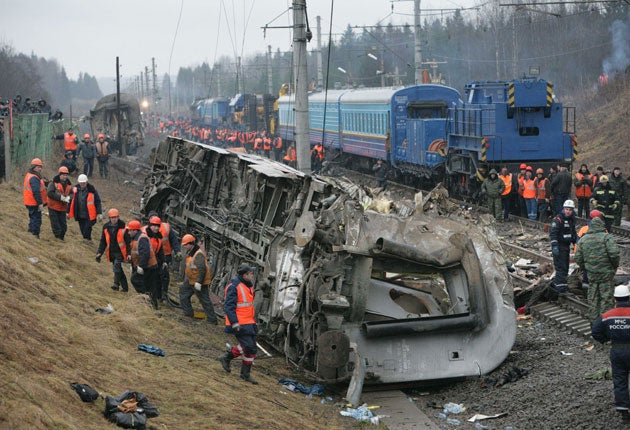Former soldier suspected of train bombing
Islamic militant blamed for an earlier attack on same Russian rail line

Russian authorities suspect a former Russian soldier of being behind Friday's train derailment which killed at least 25 people and injured around 100. According to news reports yesterday, the Russian security services have marked Pavel Kosolapov, a Russian soldier turned Islamic militant, as one of the top suspects in the train derailment, which appears to have been caused by a bomb.
Little is known about Mr Kosolapov, and there is only one grainy photograph of him in public circulation. He is believed to have converted to Islam during the 1990s and become a close associate of Shamil Basayev, the terrorist mastermind behind the Beslan school siege, who was finally killed by Russian forces in 2006.
Mr Kosolapov is wanted in connection with a bomb incident that took place on the same line and derailed a similar Nevsky Express train two years ago. On that occasion, nobody was killed. Two men from Ingushetia, the restive province that borders Chechnya, are standing trial for the earlier incident, and one of them admitted his guilt in court last week.
Russia's Interior Minister, Rashid Nurgaliyev, previously said that there were several clues in the area of the explosion that could lead to the solving of the case. He also said that a search was under way for a man of around 40 with red hair, who had been spotted acting suspiciously by local villagers preceding the attack. Whether or not this was Mr Kosolapov was unclear.
The confirmed death toll from Friday's derailment stood at 25 yesterday, with the fate of 26 passengers still unknown. Some of them may have been lucky enough to miss the train, said investigators. Relatives of those believed dead were brought to a hospital in the city of Tver, not far from the crash scene, for the grim task of identifying the bodies. In some cases, the bodies were in such a bad state that genetic tests will be required to determine identities, and the identification process was so unpleasant that one of the relatives collapsed and had to be hospitalised himself.
So far, there have been no credible claims of responsibility for the attack, and some pundits have even doubted the official explanation of terrorism. In recent years, a number of fatal accidents across Russia have been caused by decaying Soviet-era infrastructure and poor maintenance. A cover up seems unlikely in this case, however - for a government that staked its reputation on bringing supposed stability to the North Caucasus, a terrorist strike in the heart of Russia is a far more damaging blow than another infrastructure failing.
While Chechnya and the neighbouring regions in the North Caucasus remain violent and volatile, the iron-fisted rule of Ramzan Kadyrov in Chechnya was thought to have crippled the Islamic resistance. However, a new wave of suicide bombings hit Chechnya and Ingushetia this year, and a rebel website claimed over the summer that "battalions of martyrs" had been sent across Russia to wreak havoc.
Families of the victims will receive 500,000 roubles (about £10,000) in compensation from the state. Russia was in mourning yesterday as television networks took entertainment programmes off the air, and players in the Russian football league observed a minute of silence before games. A star-studded patriotic concert, slated to take place on Red Square this evening to attract attention to the Sochi Winter Olympics in 2014, has been cancelled as it was deemed inappropriate.
"Our people have been challenged," said Patriarch Kirill, the head of the Russian Orthodox Church. "They want to frighten everybody who lives in Russia." The Patriarch later led a special service for the victims at Moscow's Christ the Saviour Cathedral.
Subscribe to Independent Premium to bookmark this article
Want to bookmark your favourite articles and stories to read or reference later? Start your Independent Premium subscription today.

Join our commenting forum
Join thought-provoking conversations, follow other Independent readers and see their replies